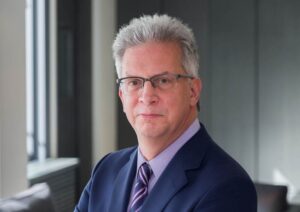Transitioning together: How we are supporting clients on the net zero journey

Authored by AXA XL’s Xavier Veyry and Corinne Southarewsky
Supporting our clients as they transition to more sustainable business models is a key part of our strategy, say Xavier Veyry, Chief Executive Officer, APAC & Europe and Corinne Southarewsky, Chief Distribution Officer and Chief Claims Officer, APAC & Europe at AXA XL.
Tackling climate change will involve a gargantuan effort if the world is to reach net zero by 2050. All businesses will need to rethink their business models and adopt low carbon technologies, creating new risks and uncertainties.
When it comes to climate change, AXA is a recognised leader within the insurance industry. Last year AXA helped establish the UN Net-Zero Insurance Alliance (NZIA), and was a founding signatory to the UN’s Principles for Sustainable Insurance in 2012. While such commitments are important, we believe our biggest contribution to tackling climate change will come from our support for clients.
Our strategy is to leverage our expertise in risk to provide solutions, whether its insuring renewable energy projects, helping our clients mitigate the risks of climate change, or supporting their ESG goals. We believe that we can make a real difference by sharing our knowledge and developing products and services to help build more resilient and sustainable businesses and communities.
De-risking the green revolution
We want to support the transition to renewable energy with a holistic range of solutions for the energy and transport industries, helping pioneering companies to de-risk innovative projects and attract investment.
As one of the first insurers to cover renewables, we remain a committed long-term partner for the energy sector. Our underwriting and risk consulting teams are helping renewable energy clients evaluate their risks, making recommendations to reduce their exposures and help them secure coverage and enhanced terms and conditions. Meanwhile, our Political Risk, Credit &
Bonds business is helping renewable projects secure financing– a pre-requisite for the development and wide adoption of renewable sources of energy.
In the aviation and shipping industries, we are actively engaged with industry leaders, identifying the risk-related challenges and ways in which the insurance market can help in the transition.
In shipping, for example, the insurance industry has established the Poseidon Principles for Marine Insurance, a global framework to assess climate risk in the maritime industry.
As is the case for the energy sector, Political Risk, Credit & Bonds team is also looking to play a key role in securing financing for the next generation of greener aircraft and ships.
Keeping pace with technology
Technology is central to the transition, from clean energy and carbon capture, to electrification and energy efficiency. The urgency and required speed of change, however, raises major challenges. The insurance industry is being asked to underwrite projects with emerging underlying technologies, for which there is limited data and experience.
In this environment, data and risk engineering will play a critical role in enabling insurers to support clients as they adopt new technologies, transform supply chains and ways of working.
Our risk consultants are already gathering insights around the underlying technologies to inform underwriters and help them design appropriate risk transfer solutions. For example, we were a pioneer in gathering risk data about electric and autonomous vehicles, and have recently strengthened our underwriting teams to help support the shift to battery-powered vehicles.
Adapting to a changing climate
The transition to a low carbon economy is only part of the challenge, as businesses will also need to adapt to a world of more extreme weather and climate volatility. After a temporary drop during the pandemic, greenhouse gas emissions continue to rise, while Europe is currently gripped by its worst drought in nearly 500 years following record temperatures and wildfires during the summer.
AXA Climate’s risk management advisory service is helping companies build their resilience to extreme events, using insurance data and modelling to adapt sites and supply chains, as well as integrate climate risks into loss prevention and insurance decisions.
In addition, AXA XL Risk Consulting continues to build out its suite of risk engineering services to help companies evaluate their natural hazard exposure and to implement risk management and risk transfer measures. For example, our digital Risk Scanning service allows risk managers to carry out multi-peril assessments of their company’s physical locations, including those that would not normally fall within the scope of traditional loss prevention programmes or site visits.
We also see an opportunity to work with clients to develop new solutions. For example, climate-linked parametric solutions can help companies hedge against extreme weather or climate events. In the renewable space, parametric insurance is already being used to cover more challenging risks, such as non-damage business interruption coverage, power generation shortfalls, accumulations of natural catastrophe risk or extreme events, or alongside captive insurance.
Recognising good ESG
Many of our clients are working to meet ambitious ESG targets and would like to see their commitment reflected in the terms and conditions of their insurance coverage. Companies with good ESG are more likely to manage their risk diligently, however, translating that into actuarial measures and premium isn’t easy.
We are exploring ways to reflect ESG in our products and services. In 2020, we worked with Italian energy company Enel to launch the world’s first sustainability-linked insurance programme, whereby premium is linked to Enel’s renewable energy goals. In France, we have partnered with insurance broker Marsh to offer clients a 25% reduction in the deductibles in their environmental risk policies should they integrate certain biodiversity commitments into their corporate strategy.
In addition, we are focusing on specific sectors to develop an understanding of which companies are transition leaders allowing us to take that into account when designing their insurance coverage. We have started that work in APAC & Europe for the energy sector.
Creating actionable insights
Underwriting new technologies and assessing clients’ ESG efforts are challenging opportunities, and we believe that access to more and additional sources of data, and the use of artificial intelligence (AI), will help us overcome the issues that market is currently facing.
Insurance has always been a data-led industry, but it is now leveraging new data sources. Additional data helps us to better model new or existing risks, and price them more accurately.
We are also using data analytics – often powered by artificial intelligence – to help our clients, turning environmental and climate data into actionable risk insights and innovative solutions, including parametric insurance and digital risk assessments.
Upskilling risk professionals on the issues associated with climate change and the transition to net-zero is also critical. Launched in 2021, the AXA Climate School provides online training that helps understand the impact of climate change and biodiversity loss, and how to make a difference. By the end of the year, all AXA Group employees will have completed the training,
We are also making it available to clients and stakeholders, many of which have already signed up to it.
Share skills and knowledge
AXA was among the first insurers to get involved in the fight against climate change and has made a number of important commitments. We are now moving beyond these high-level initiatives, developing practical solutions that will support businesses during the transition. This is where we believe we can make a difference. Only by sharing expertise and knowledge, working together on solutions, will we be able to move to a more sustainable world.





